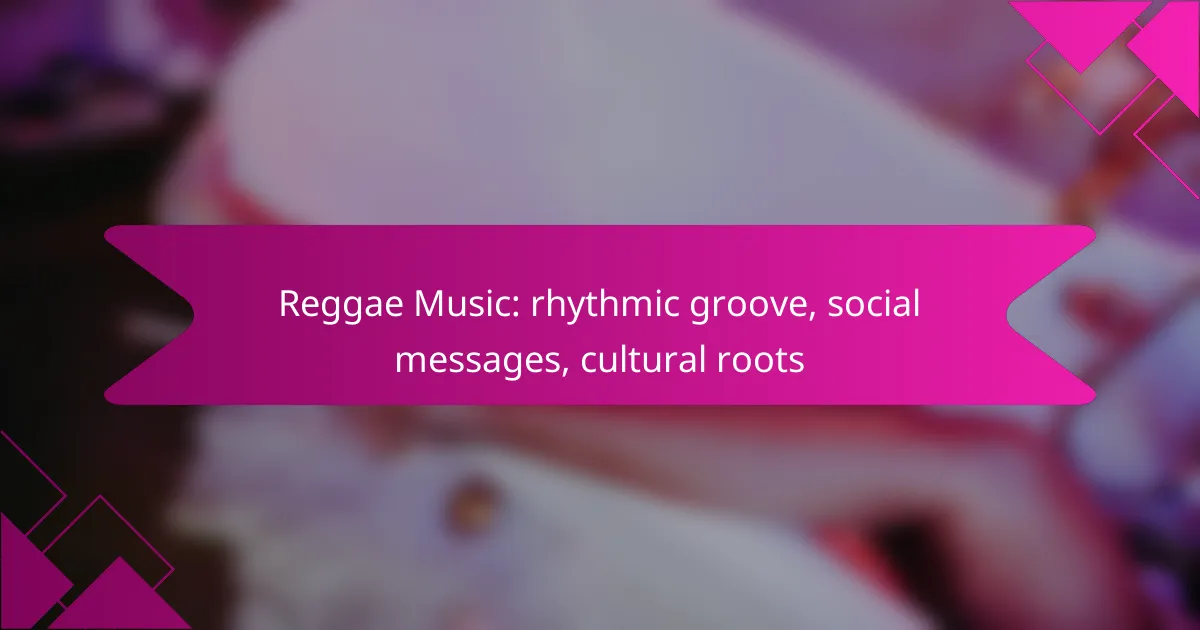Reggae music, with its distinctive rhythmic groove and deep cultural roots, originated in Jamaica and has become a powerful medium for social change. It blends various musical influences to convey impactful messages about unity, resistance, and love, inspiring listeners to engage in activism and advocate for justice.
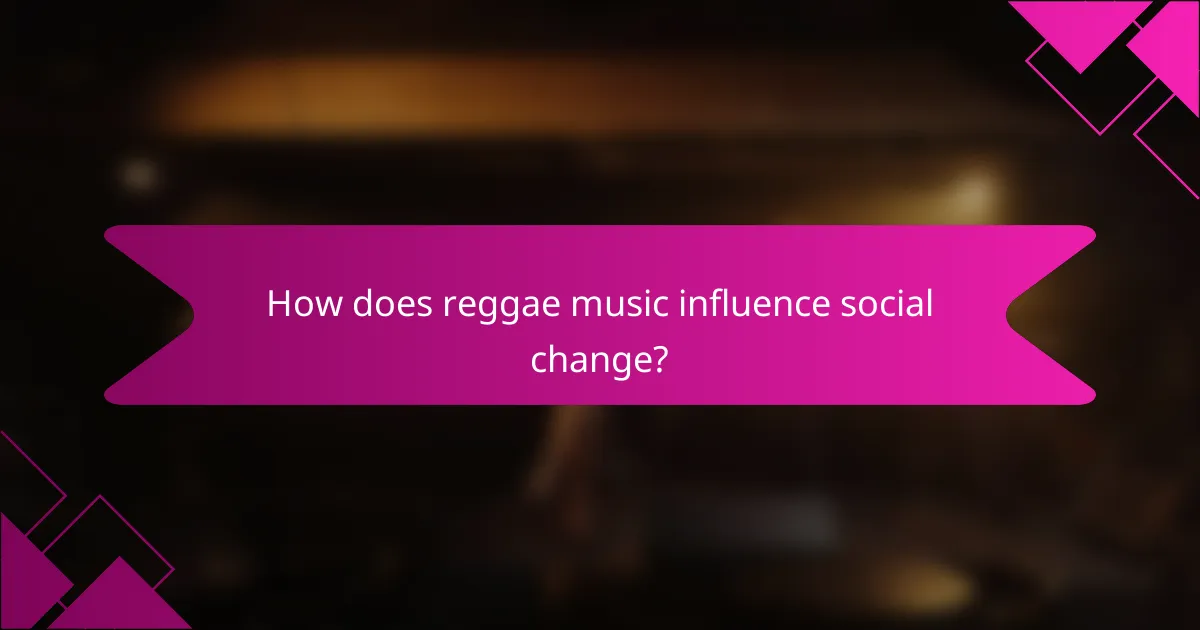
How does reggae music influence social change?
Reggae music significantly influences social change by promoting awareness of social issues and inspiring collective action. Its rhythmic grooves often carry powerful messages that resonate with listeners, encouraging them to engage in activism and advocate for justice.
Empowerment through lyrics
The lyrics of reggae songs frequently address themes of resistance, equality, and social justice, empowering listeners to reflect on their circumstances. Artists like Bob Marley and Peter Tosh used their music to highlight struggles against oppression and advocate for human rights, making their messages relatable and inspiring.
For example, songs like “Get Up, Stand Up” serve as anthems for those fighting against injustice, motivating individuals to stand up for their rights. This lyrical empowerment fosters a sense of community and shared purpose among listeners.
Community activism initiatives
Reggae music often acts as a catalyst for community activism, with artists and fans collaborating on various initiatives. Many reggae musicians participate in or support charitable events, educational programs, and social campaigns aimed at improving local conditions.
In Jamaica, for instance, music festivals frequently raise funds for social causes, such as education and healthcare. These initiatives not only promote reggae but also create tangible benefits for communities, reinforcing the connection between music and social change.
Global movements inspired by reggae
Reggae’s influence extends beyond Jamaica, inspiring global movements focused on social justice and equality. The genre has played a crucial role in various international campaigns, including anti-apartheid efforts and movements advocating for racial equality.
For instance, reggae’s impact can be seen in the rise of the Rastafari movement, which promotes social change through cultural identity and spirituality. This global reach demonstrates how reggae music can unite diverse communities in the pursuit of common goals, fostering solidarity across borders.
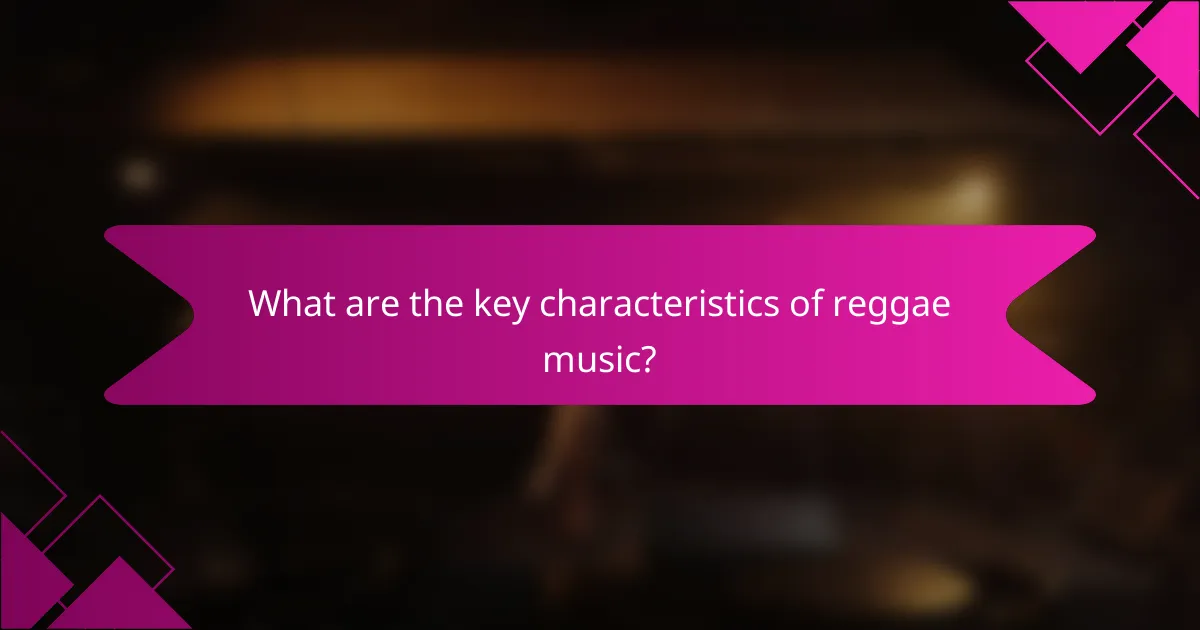
What are the key characteristics of reggae music?
Reggae music is characterized by its distinctive rhythmic groove, social and political messages, and deep cultural roots. This genre, originating from Jamaica, blends various musical influences to create a unique sound that resonates with themes of unity, resistance, and love.
Rhythmic groove and offbeat guitar
The rhythmic groove in reggae is often defined by a steady, laid-back tempo that creates a relaxed feel. A hallmark of this genre is the offbeat guitar strumming, known as the “skank,” which emphasizes the second and fourth beats of each measure. This syncopation contributes to the genre’s signature sound and invites listeners to move to the music.
Musicians often use a combination of chords and rhythmic patterns to enhance the groove. The interplay between the guitar and other instruments creates a rich texture that is both engaging and soothing, making reggae a popular choice for various settings.
Use of bass and drums
In reggae, the bass guitar plays a crucial role, providing a deep, resonant foundation that drives the music forward. The bass lines are typically melodic and syncopated, complementing the offbeat guitar and enhancing the overall groove. Drums in reggae are often played in a way that emphasizes the snare on the third beat, contributing to the genre’s distinctive rhythm.
This combination of bass and drums creates a solid backbone for the music, allowing for expressive melodies and vocal lines to shine. The bass and drum interplay is essential for establishing the laid-back yet powerful feel that reggae is known for.
Vocal style and lyrical themes
Reggae vocal styles often feature a smooth, relaxed delivery that aligns with the genre’s overall vibe. Singers may employ a range of techniques, from soulful melodies to spoken word elements, allowing for emotional expression. The lyrics frequently address social issues, love, spirituality, and resistance, reflecting the cultural and political landscape of Jamaica.
Common themes in reggae lyrics include unity, empowerment, and social justice, often inspired by the Rastafarian movement. This focus on meaningful messages resonates with audiences worldwide, making reggae not just music but a vehicle for social change and cultural expression.
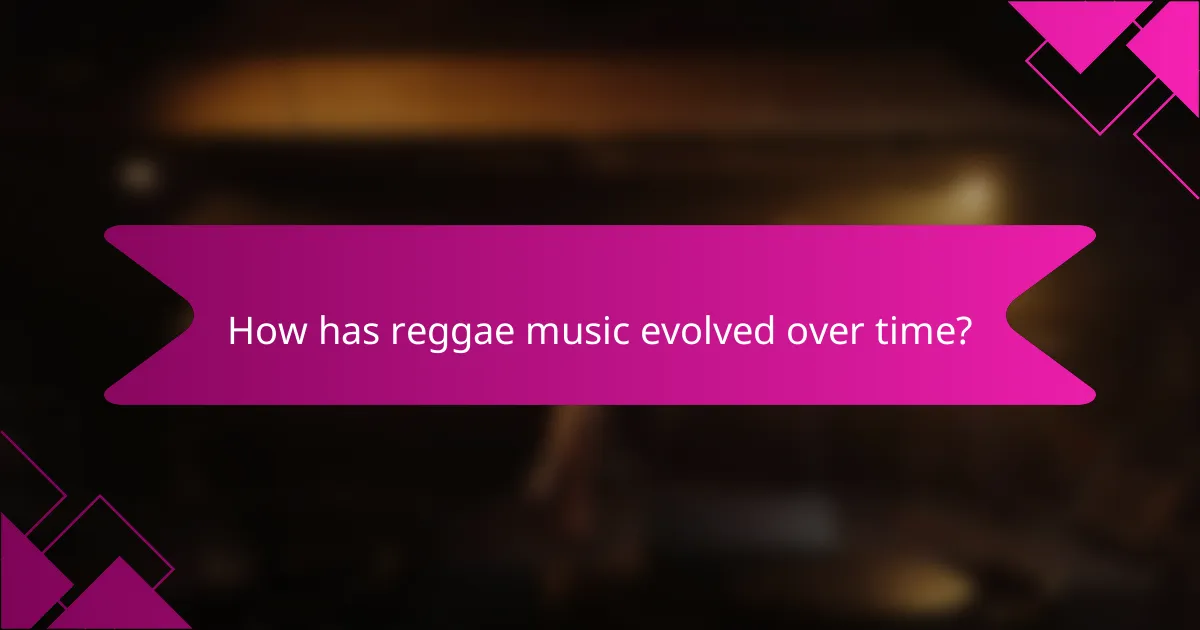
How has reggae music evolved over time?
Reggae music has evolved significantly since its inception in the late 1960s, influenced by various musical styles and social movements. Its development reflects changes in cultural identity, political landscapes, and global musical trends.
Roots reggae origins in Jamaica
Roots reggae originated in Jamaica during the late 1960s, characterized by its heavy bass lines and socially conscious lyrics. Artists like Bob Marley and Peter Tosh brought attention to themes of resistance, spirituality, and social justice, which resonated deeply with the struggles of the Jamaican people.
The genre’s sound is defined by its distinctive rhythm, often featuring a one drop beat, where the bass drum plays on the third beat of the measure. This laid-back groove became a hallmark of roots reggae and set the stage for its global appeal.
Influence of ska and rocksteady
Before reggae, Jamaica’s music scene was dominated by ska and rocksteady, both of which significantly influenced the development of reggae. Ska, with its upbeat tempo and horn sections, laid the groundwork for reggae’s rhythmic style, while rocksteady introduced slower tempos and a focus on bass and guitar.
The transition from ska to rocksteady and then to reggae marked a shift in lyrical content as well, moving from party themes to more serious social commentary. This evolution reflected the changing socio-political landscape in Jamaica during the 1960s and 1970s.
Modern adaptations and fusion genres
In recent decades, reggae has adapted and fused with various genres, leading to the emergence of styles like dancehall and reggae fusion. Dancehall, which developed in the late 1970s, incorporates electronic instrumentation and faster rhythms, appealing to a younger audience.
Reggae fusion blends traditional reggae with elements of rock, hip-hop, and pop, broadening its reach and influence. Artists like Sean Paul and Shaggy have successfully integrated reggae with mainstream music, showcasing its versatility and global appeal.
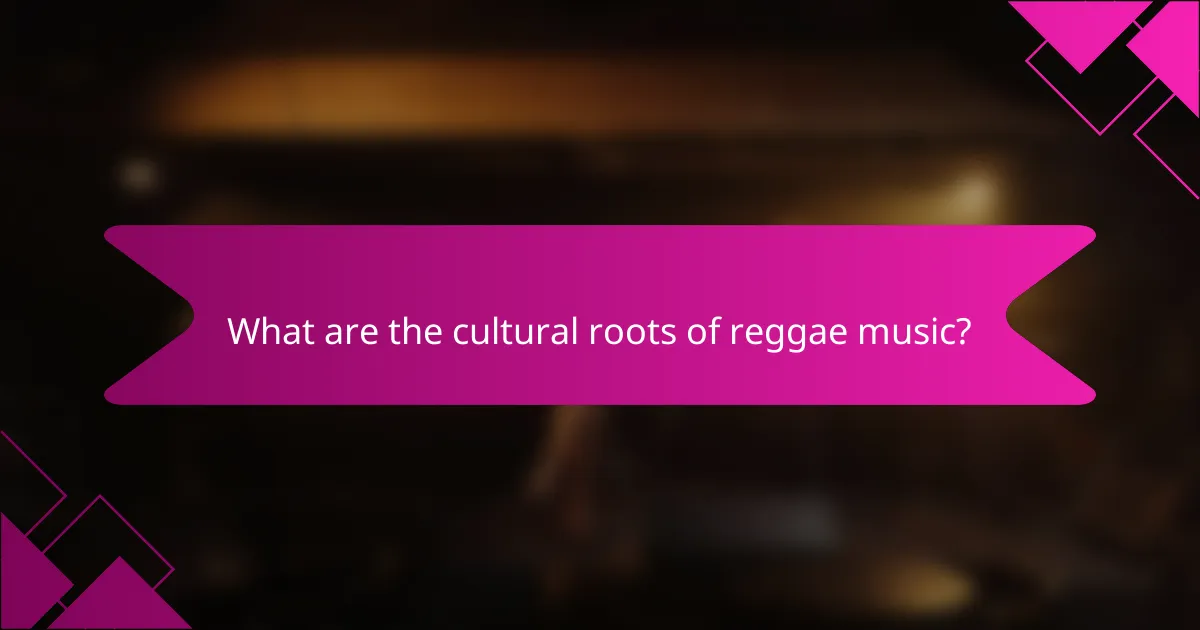
What are the cultural roots of reggae music?
The cultural roots of reggae music are deeply intertwined with Jamaica’s history, social struggles, and spiritual beliefs. Originating in the late 1960s, reggae reflects the experiences of the Jamaican people, particularly their fight against oppression and their connection to African heritage.
Rastafarian beliefs and practices
Rastafarianism plays a crucial role in the cultural roots of reggae music. This spiritual movement emphasizes a connection to Africa, particularly Ethiopia, and promotes themes of social justice, unity, and resistance against oppression. Reggae artists often incorporate Rastafarian symbols and messages in their music, celebrating the culture and beliefs of the movement.
Key practices of Rastafarianism, such as the use of marijuana for spiritual enlightenment and the rejection of materialism, are often reflected in reggae lyrics. The music serves as a medium for expressing the Rastafarian worldview, advocating for peace, love, and equality.
Historical context of Jamaican society
The historical context of Jamaican society significantly influences reggae music. The legacy of colonialism, slavery, and economic hardship has shaped the struggles and aspirations of the Jamaican people. Reggae emerged as a voice for the marginalized, addressing issues such as poverty, inequality, and social injustice.
During the late 1960s and early 1970s, Jamaica experienced political turmoil and social unrest, which fueled the growth of reggae. Artists like Bob Marley used their music to comment on these societal issues, making reggae a powerful tool for social change and awareness.
Influence of African heritage
Reggae music is heavily influenced by African heritage, which is evident in its rhythms, instruments, and themes. The use of traditional African drumming patterns and the incorporation of storytelling reflect the rich cultural legacy of the African diaspora. This connection to African roots is a vital aspect of reggae’s identity.
Moreover, reggae often explores themes of identity, resistance, and cultural pride, resonating with the experiences of people of African descent worldwide. The celebration of African culture within reggae music fosters a sense of belonging and empowerment among its listeners.
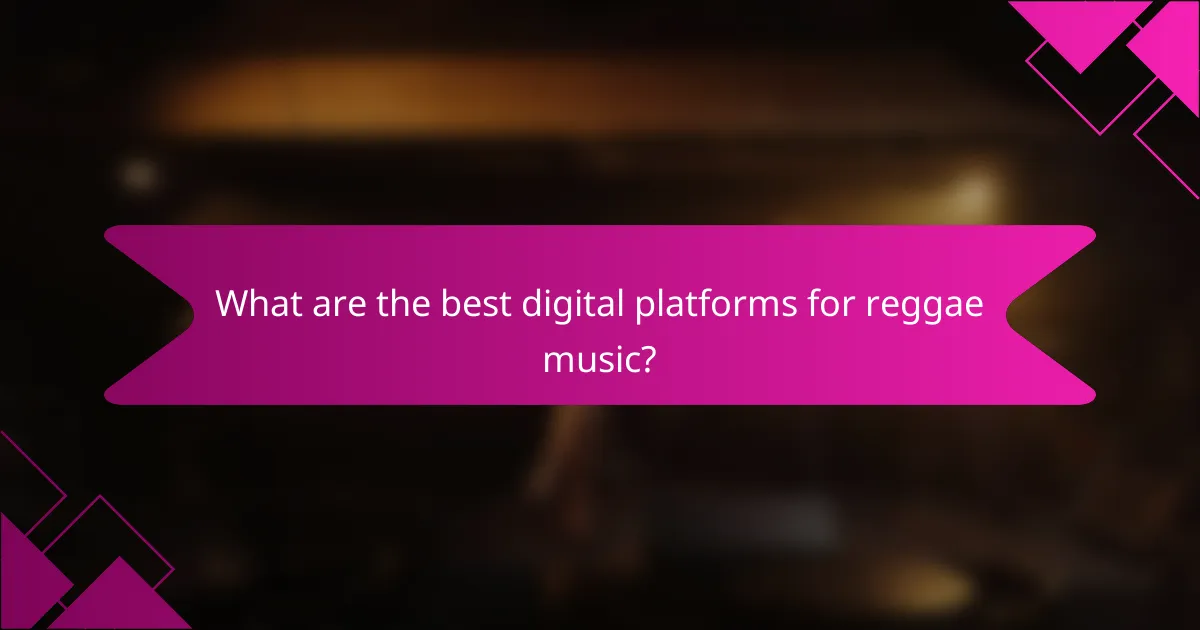
What are the best digital platforms for reggae music?
The best digital platforms for reggae music include popular streaming services, digital download sites, and specialized platforms that cater to reggae enthusiasts. Each option offers unique features that can enhance your listening experience and access to a wide range of reggae tracks.
Streaming services like Spotify
Streaming services such as Spotify provide extensive libraries of reggae music, allowing users to listen to both classic and contemporary tracks. With curated playlists and personalized recommendations, you can easily discover new artists and songs that fit your taste.
Consider subscribing to Spotify Premium for an ad-free experience and offline listening. The platform also offers features like collaborative playlists, which can enhance your social listening experience with friends who share your love for reggae.
Digital downloads on iTunes
iTunes is a reliable platform for purchasing and downloading reggae music directly to your devices. You can find a wide selection of albums and singles, often including exclusive content that may not be available on streaming services.
When using iTunes, be aware of the pricing, which typically ranges from a few dollars for singles to around ten to fifteen dollars for full albums. This option is ideal for those who prefer owning their music rather than streaming it.
Reggae-focused platforms like Tidal
Tidal is a music streaming service that emphasizes high-fidelity sound quality and exclusive content, making it a great choice for reggae fans who appreciate audio quality. The platform features a dedicated reggae section, showcasing both mainstream and underground artists.
Additionally, Tidal offers curated playlists and music videos, enhancing the overall experience. Keep in mind that a subscription is required, and prices may vary depending on the audio quality you choose, with options for standard and high-fidelity streaming.
